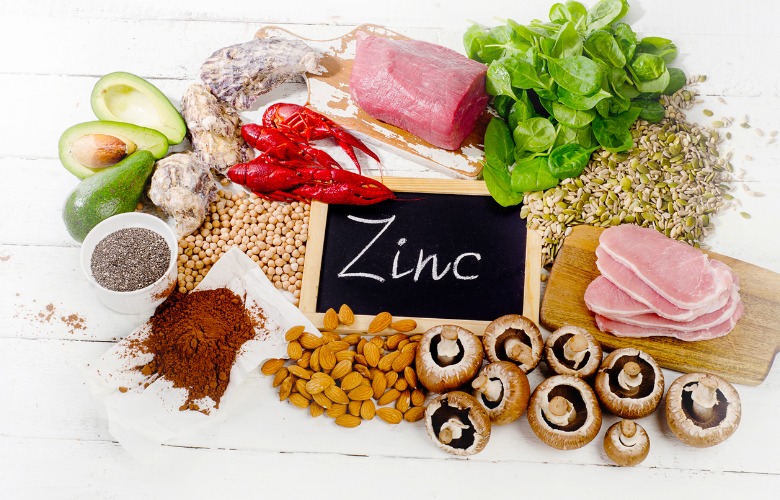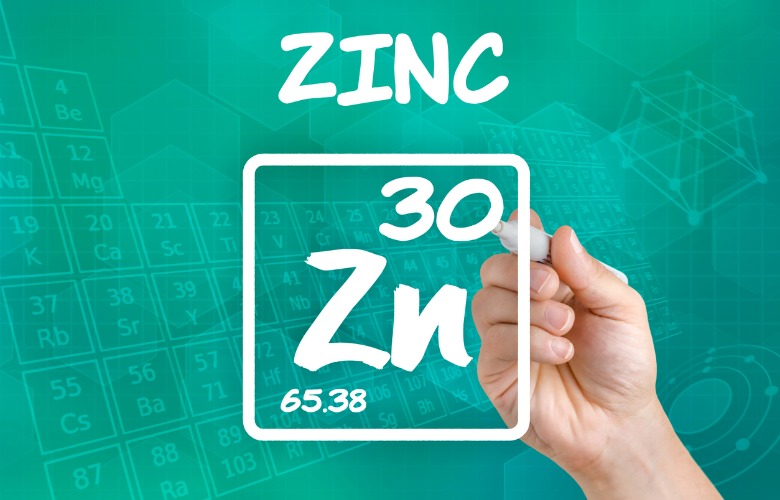A Guide to Zinc and Your Health
What Is Zinc?
There are six essential nutrients that the body needs, one of which is the mineral group. Minerals are micronutrients categorized as either major or trace minerals. Zinc is a trace mineral, but it classifies as an “essential” mineral.
The term “essential” refers to nutrients that the body cannot produce or synthesize on its own. The body also doesn’t have the ability to store these essential nutrients. Instead, it relies on external essential nutrient sources, such as food and supplements.
What Does Zinc Do for the Body?
Zinc plays chief roles in a person’s genetic makeup, metabolism, and immunity. It’s a crucial mineral that aids in proper wound healing and injury recovery. It also affects your gustatory (taste) and olfactory (smell) senses.
Gene Expression
Gene expression is the process of converting DNA “instructions” into a functional product. These “products” include proteins and other important molecules.
You can also think of gene expression as a switch that controls protein creation in the body. Moreover, it regulates exactly when and how much protein the body produces.
According to scientists, zinc is crucial for proper gene expression. For example, zinc deficiency can impair growth, cell cycle, and cell division. Researchers also found that cells that lack this trace mineral have twice the DNA.
Pregnancy and Labor
The amount of zinc needed goes up during pregnancy to supply both the mom and the developing fetus. According to experts, zinc deficiency may raise the risks of preterm birth. A lack of this trace mineral may also result in longer labor times.
Supplementing with zinc, therefore, may be very helpful during pregnancy. Note that as many as 80% of pregnant women have insufficient zinc intake.
Proper Development and Growth of Children
Since zinc plays a critical role in cell growth, it has direct effects on growth and development. Also, remember that this trace mineral is essential for gene expression. That’s why it’s as vital during infancy and childhood as it is in adulthood.
Without enough zinc, infants and children may experience growth and development issues. For example, it may cause slow or impaired motor development and activity. It may also hinder nerve-related functions that can affect motor skills.
That’s why zinc is often one of the best supplements for kids and pregnant women. As always, make sure you consult with your doctor before taking them.
Metabolic Functions
The essential activities of over 300 enzymes and hormones in the body rely on zinc. Many of these processes have to do with metabolism, digestion, and excretion. As such, a lack of this trace mineral can have negative effects on your weight and even strength.
Digestive Tract
Zinc is also a chief player in the health and strength of the intestinal barrier. It helps keep the intestinal wall strong and non-porous. So, having too little or too much of it can result in problems like inflammation and diarrhea.
Immune System
Zinc keeps the immune system strong, thanks to its roles in cell functions and activities. In fact, scientists refer to this mineral as the “gatekeeper of immune function.” For starters, it’s antioxidant and anti-inflammatory.
Supplements with zinc may also shorten the duration of the common cold. In participants who took 80 to 92 mg of the trace mineral per day, the duration of the cold was 33% shorter.
Zinc supplements can also lower the risks of infections. More than that, it may help encourage better immune responses in older adults. In this way, zinc supplements are ideal for men and women in their 50s and above.
Wound Healing and Injury Recovery
Zinc is crucial throughout all phases of the body’s wound healing process. Aside from helping reduce inflammation, it also aids in the repair of membranes. It’s also key to blood clotting, the creation of new tissues, and the closure of wounds.
Olfactory and Gustatory Senses
An enzyme called “carbonic anhydrase” depends heavily on zinc. This specific protein, in turn, is crucial for the smell and taste functions. As such, zinc deficiency can result in various smell and taste disorders.
For instance, a lack of zinc can result in anosmia, which makes a person unable to smell. It can also cause hyposmia, a reduced ability to smell. It can also result in taste disorders, such as dysgeusia (distorted sense of taste).
Eye Health
The eyes boast of high concentrations of zinc. The trace mineral also appears to have a role in forming the retina’s visual pigments. In this way, having too little zinc may result in night blindness.
Zinc appears to have positive effects on macular degeneration, too. It’s a degenerative condition that causes vision loss, especially in older adults. It causes distorted vision and, over time, can lead to a complete loss of central vision.
The great news is that zinc supplements may help slow down macular degeneration. Patients who supplemented with zinc showed sharper vision than those who didn’t. They also had less vision loss after two years.
How Much Zinc Should a Person Take Every Day?
The amount of zinc you need each day depends on your age, sex, and if you are pregnant. Older adults are often those who need to supplement. The same goes for those with diseases that impair their body’s ability to absorb zinc.
Below is a quick guide on the recommended dietary allowance (RDA) for zinc.
Infants and Children
New-born babies need 2 mg of zinc each day until they turn six months. Seven-month-old babies to three-year-old kids need 3 mg of the trace mineral. This then goes up to 5 mg a day for children between the ages of four and eight.
Preteens, Teens, and Adults
From age 9 to 13, kids need to have a daily intake of 8 mg of zinc. By the time boys hit the age of 14, they need 11 mg of zinc every day, which is the same amount they need as adults.
By contrast, females between the ages of 14 and 18 need 9 mg of zinc each day. However, this drops to 8 mg once they become adults.
Expectant and Breastfeeding Women
Pregnant teenagers and breastfeeding women require 12 mg of zinc per day. Pregnant women, on the other hand, need only 11 mg. Breastfeeding teenagers need a daily intake of 13 mg.

What Foods Have Zinc?
A three-ounce serving of oyster can already deliver more than 94% of your daily zinc needs. That’s why it’s the best source of this essential mineral.
However, it’s not a smart idea to keep eating oysters every day, as it lacks other nutrients. Also, people with seafood or shellfish allergies may not be able to eat them.
The great news is that red meat and poultry contain good amounts of zinc. If your allergy is specific to oysters, you can get zinc from other seafood, as well as crabs and lobsters. Fortified food products, like cereals, milk, and other dairy items, also contain zinc.
Many superfoods for digestion, such as chia and miso, also have zinc in them. You can also get some of this trace mineral from whole grains, beans, legumes, and nuts.
Can You Take Too Much Zinc?
Yes, it’s possible to take too much zinc, especially if you over-supplement. That’s why it’s best to watch what you eat when you do take supplements with zinc. It’s also a smart idea to speak to your doctor, as they may give you specific dosing instructions.
Supplying your body with too much zinc can result in vomiting, nausea, and loss of appetite. You may also experience stomach cramps and aches, diarrhea, and even headaches.
However, long-term overconsumption of zinc can cause chronic health issues, too. For instance, it may result in a decrease in your good cholesterol levels. This may happen if you take more than 50 mg of zinc each day.
Moreover, just as zinc deficiency can affect your sense of taste, zinc overdose can alter it, too. Too much zinc can leave you with a bad, metal-like taste in your mouth.
You may also develop immunity-related issues if you take too many zinc supplements. For example, excess zinc levels can suppress your immune system. This can then result in more frequent infections.
How Can One Avoid Taking Too Much Zinc?
The best way is to keep track of your zinc intake and make sure it doesn’t go beyond your RDA. It’s best that you measure your consumption of both food and supplements. By knowing how much zinc is in your food, you can adjust your supplement intake.
You can also use a vitamin and mineral tracking app. These programs can help you calculate your nutrient intake better and much quicker. With an app like this, you’ll know right away if you’ve reached your RDA for zinc (or other nutrients).
Zinc and Health Always Go Hand in Hand
The fact alone that over 300 enzymes rely on zinc proves that zinc and health share an unbreakable bond. This, in turn, should be enough reason to ensure that you meet your RDA for the trace mineral. In doing so, you can raise your body’s ability to fight off diseases, and you also get to feel better from inside to out.
Just remember to dose right so that you can avoid the effects of excess zinc.
Ready to shop for high-quality zinc supplements? Then check out our extensive collection of zinc products!



